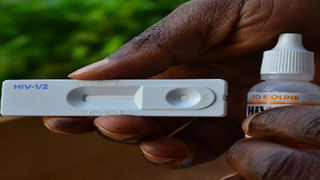
A laboratory technician displays a Bioline HIV testing kit. Kenya is facing a stock-out for regular tests for adults
|News
Premium
Reagents snag blocks HIV viral load testing
Children born to HIV positive mothers in public hospitals are not able to know their status because of a shortage of reagents for testing.
This has also affected the adults who would want to know their viral load, leading to failure in treatment and developing of resistance on their antiretroviral drugs. Apart from infant test kits, the country is also facing a stock-out for regular tests for adults.
Most public hospitals in Migori, Homa Bay, Mombasa and even Kenyatta National Hospital have run out of reagents and consumables for testing viral load in patients living with HIV.
Mr Peter Gwengi, director, Lake Victoria Initiative for people living with HIV said most children have not been tested.
HIV test
“When a child is born, he or she should be put on prophylaxis, then after six months a HIV test is done, a second test at 12 months and a third one at 18 months, some of the children have not been able to get the test,” he said
“No reagents, that’s the song of the day,” says Mr Gwengi, who has been living with the virus for the past 30 years. Ms Everlyne Atieno who started her drugs six years ago had a bout of illness that rendered her immobile. She could not walk and had to be taken care of by her sister. When she went to hospital, medics recommended a second-line regimen since she was growing weak, it meant that either she was failing or cannot tolerate the drugs.
She was in the first line regimen, however, before she was placed on the second line, a viral load test and resistance drug test had to be conducted.
Challenge with testing
“I have gone to three hospitals in Kisumu, Migori and Homa Bay that conduct the viral load test. The last one I went to was in November last year. In all, I was told to leave my contacts that the hospital would call once the reagents are available but I have not received any call,” she said.
Dr Rose Wafula, Head National Aids and STIs Control Programme (Nascop) admitted there has been a challenge with testing.
“Reagents are already in the country, what was missing are consumables [such as] tubes for collection of samples in the laboratories and we are doing all we can to ensure that they are here by next week,” she said Dr Wafula said that Nascop has made a plan on how the redistribution is going to be done so that the backlog is cleared and testing resumes.
Dr Jacob Bulimo, the Elizabeth Glaser Paediatric Aids Foundation senior technical lead HIV care and treatment, told Saturday Nation that, through the viral load testing, one is able to check whether the patient is responding well to the drugs. This should be done after every six months to all HIV patients.
Viral load test
“If the viral load is more than 200 copies per ml, then definitely there is a problem. There could be non-adherence to medication, lack of caregiver support, poor clinic visits and even stock outs. We tease out everything and move to non-adherence counselling training,” he says.
A repeat of the viral load test is done after the three months, in case of a failure, then the patient is eligible to proceed to the next line of medicine.
One of the challenges in viral load testing in the country is the price of the test, which is relatively expensive compared to other laboratory tests.
Pricing of viral load tests are reportedly much higher, making scale-up much less affordable with the cost per test estimated at anything between Sh5, 000 and Sh10, 000, depending on the hospital.





